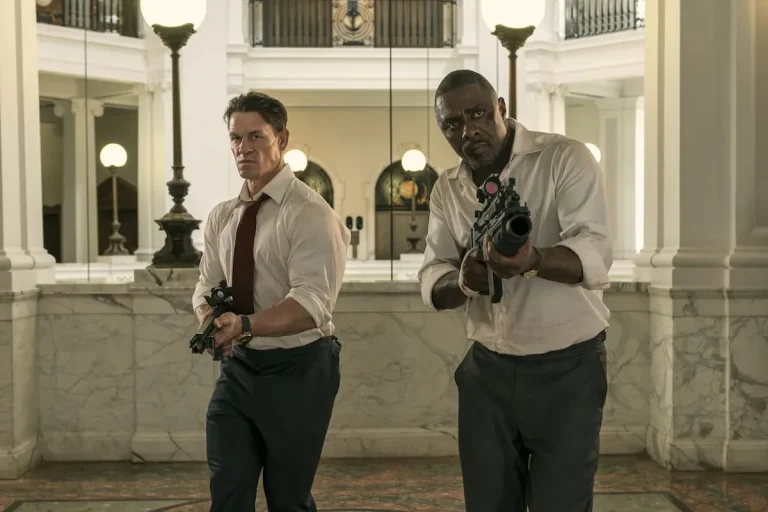Despite its perceptive observations about the crushing nature of the gig economy, “Good Fortune” (2025) is straightforwardly earnest in its presentation that it feels like a throwback. Aziz Ansari, in what is his second attempt at a cinematic directorial debut, crafts a loving merger of “It’s A Wonderful Life” and “Trading Places,” which surprisingly lacks much raunchiness or physical gags. Instead, Ansari finds cathartic, relatable humor in the collective hurdles that are brought upon by class divisions. Even if there are moments in which “Good Fortune” is ham-fisted in its commentary, there’s merit to a funny, heartfelt film that has something to say.
Those familiar with Ansari’s terrific Netflix series “Master of None” know that he has a talent for directing, writing, producing, and starring in roles that essentially allow him to play a loosely fictionalized version of himself. Ansari stars in “Good Fortune” as Arj, whose interest in documentary filmmaking mirrors his own interest in the educational arts.
Unlike the real Ansari, Arj has been forced to make his passion a hobby, as he is between jobs and forced to sleep in his car. Arj’s luck briefly turns around when he earns a job as the assistant to the wealthy entrepreneur Jeff (Seth Rogen), but it’s only a temporary reprieve that leaves him even more frustrated with his quality of life. It’s when Arj is at his lowest that divine intervention comes into play. The angel Gabriel (Keanu Reeves) decides to change Arj’s mind by switching his life with Jeff’s, forcing both men to live within each other’s shoes.
Also Read: 25 Feel-Good Movies and where to Watch them
“Good Fortune” seems to understand how good its logline is, and Ansari does a great job at keeping the setup fairly simple. There are some humorous bits showing the hierarchy of angels (as Gabriel’s only responsibility is to prevent people from texting while driving), but “Good Fortune” immediately begins setting up the reasons why Arj has lost hope. This isn’t exactly a groundbreaking revelation about the realities of a post-recession America, but it’s not trying to be. The observations made regarding the subtle indignities that Arj faces are quite affecting, even if Ansari is able to undercut any moment with a clever one-liner.
What’s most fascinating about the structure of “Good Fortune” is the way Ansari divides the story. Even if it doesn’t begin with any sort of formal invention, “Good Fortune” switches perspectives from Arj to Jeff at about the halfway point, allowing the viewer to see both characters at their most vulnerable. Ansari makes no attempt to suggest that their problems are equivalent; in fact, one of the central jokes lies in how misguided Gabriel’s scheme is. While he had intended to show Arj that wealth and status wouldn’t make him any happier, he’s dismayed to find that all of his problems disappear when he occupies Jeff’s life.

Both protagonists are surprisingly complex, especially since Ansari and Rogen have well-established screen personas that allow them to quickly get into character. Arj’s issue isn’t related to his work ethic or compassion for others, but rather his attitude. Given the burdens he’s under on a daily basis, Arj isn’t convinced that there’s any possibility for legitimate change.
Must Check Out: 10 Keanu Reeves Cameos You Probably Missed—but Will Absolutely Love
Ansari’s snappy, incredulous reactions ensure that the character never feels too cynical, but Arj is made a more interesting character as a result of a romantic bond he forms with his co-worker Elena (Keke Palmer), who is attempting to unionize the employees at a hardware store. It’s a credit to the sincerity of Palmer’s performance that she can deliver the film’s most insightful, wholesome lines without ever breaking with the light-hearted tone.
Rogen’s performance is equally impressive because he’s able to make Jeff a character who is guilty of ignorance, but not necessarily maliciousness. Although it’s easy to imagine that “Good Fortune” could become an “eat the rich” style satire, the film seems to have more animosity towards the system in place than anyone who has benefited from it.
For Jeff, there’s never been an opportunity to consider that his luxurious existence has come at the detriment of others. Rogen is able to play the dumbfounded moments of revelation humorously, whilst giving an emotional maturity to the character. Perhaps the film is a bit too kind in its notion that people can change, but Rogen is a good enough actor to make it feasible that Jeff would be an exception to the rule.
Related Read: The Six Career Stages of Keanu Reeves That Made Him A Cultural Icon
The film’s best performance, and perhaps its best quality overall, is the terrific performance by Reeves, who has once again proven that he is a far more self-aware actor than he’s been given credit for. Reeves’ staid, righteous persona within his classic genre films may have been subjected to some occasional ridicule over the years, but that’s exactly why he’s perfectly cast as a genuinely wide-eyed, curious creature who is simultaneously wise beyond belief and entirely innocent.

To play a character who is slowly adapting to being human (as Gabriel is punished for breaking heavenly rules by being stuck in a mortal body) is no easy feat, but Reeves’ delivery makes Ansari’s writing even sharper. It’s a performance that adheres to the situational comedy required for different segments of the story. As hilarious as it is to watch Gabriel incompetently try to impose knowledge over Jeff, his moments of astonishment at humanity’s experiences are legitimately gut-busting.
“Good Fortune” certainly feels like a directorial debut, as it’s actually quite impressive how contained and stagelike a majority of the scenes are. There’s no lack of dynamic gags, but “Good Fortune” seems to avoid any significant crowd scenes, action moments, or physical hijinks in favor of the interactions between its three main characters.
Perhaps it was Ansari’s intention to make something decidedly low-key in the wake of the convoluted production of “Being Mortal,” the film which had its production shut down due to an on-set controversy. It’s easy to imagine that he could grow into a more visually ambitious filmmaker with more features on his resume, but it’s a credit to Ansari’s writing that the film never hits a dull moment in its 98 minutes due to the entertainment value of the dialogue.
“Good Fortune” does rely on some conveniences, and some may find that it isn’t radical enough in its conclusion. Perhaps there’s something a bit antiquated about the humanism that Ansari is interested in, but at the same time, a film that is so earnestly optimistic about people’s willingness to look out for each other is radical in its own way. It’s one of the year’s best comedies, and its open-hearted warmth is surely a breath of fresh air.






![Chungking Express [1994] Review: Men Without Women](https://79468c92.delivery.rocketcdn.me/wp-content/uploads/2019/06/rexfeatures_390927lg-768x432.jpg)
![Terrorizers [2021]: ‘TIFF’ Review – A look into cyberspatial nightmares](https://79468c92.delivery.rocketcdn.me/wp-content/uploads/2021/09/Terrorizers-1-highonfilms-768x384.jpg)